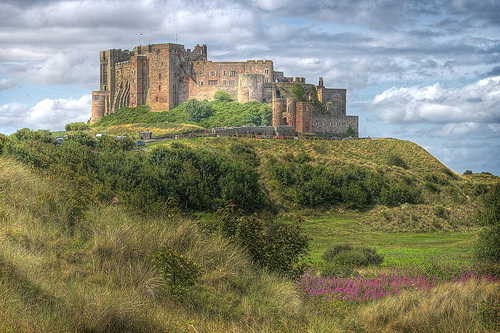Bamburgh
The peaceful coastal town of Bamburgh is located in the beautiful county of Northumberland. During the early medieval period this part of the country was considered to be the most important. The castle still dominates the town and the village at the foot of the castle seems somehow smaller than it really is.

It was during the Victorian period when the town first became popular as a tourist destination, people flocked here as a result of the daring rescue undertaken by local girl Grace Darling and her father when the SS Forfarshire hit rocks on September 7th 1838. These days the local population is relatively small, only around 300 people live here, but during summer the village is always filled with people who come here to enjoy everything the village and the castle has to offer.
Unlike many seaside towns and villages here you will not find amusements arcades, ice cream parlours and countless fish and chip shops. Bamburgh has kept a firm grip on what made the town so popular in the past and today offers a welcome respite from the garish seaside resorts up and down the English coast. The ice cream that is for sale here is all made locally and the tea shop sells all the refreshments you could need.
Bamburgh’s Beaches
The coastline here is truly spectacular, with sweeping and expansive beaches, jagged rocks marking the shoreline and miles of rolling sand dunes. The beaches may be peaceful now but once upon a time they were the landing point for Viking longboats filled with raiding parties. The beaches here are regularly awarded flags for both cleanliness and quality. From all around the village and especially from the castle battlements you can get wonderful views of the nearby Farne Islands and the landscape of the Cheviot Hills.
St Aiden
Bamburgh is the place where St Aiden landed in 635AD, at the request of King Oswald to spread Christianity to the people of Northumbria. This is where St Aiden founded his first wooden church, close to where the modern church of St Aiden now stands. It was from here that Christianity spread throughout England. The presence of the royal castle and the building of the church here led to the formation of the village of Bamburgh.
Bamburgh Castle
The castle crag stands a full 180ft above sea level, and from the castle positioned on top of this massive basalt mountain you get the most spectacular views of the surrounding area and beautiful Northumbrian coastline. Unlike the vast stone structure we see today the early castle was little more than a wooden fortification, and it wasn’t until the 12th Century that the first stones were laid by the Normans.
The castle remained strong and was regarded as impregnable until it met the cannon fire of the 15th century, though it took a full nine months of siege for the castle to finally fall. There has been archaeological work going on here since the 1950’s and the site has proved to be one of the most interesting and important in the country.



